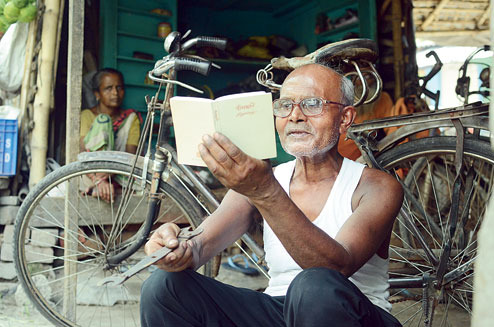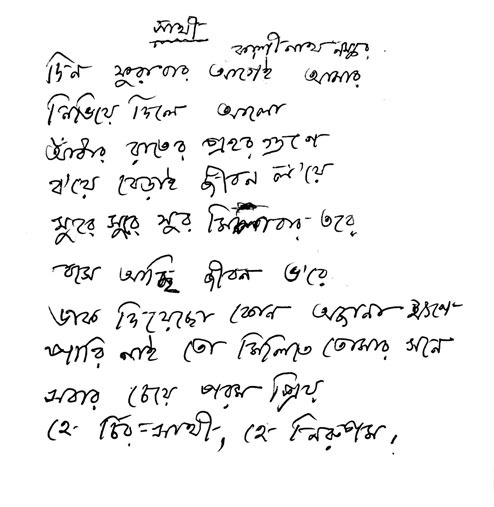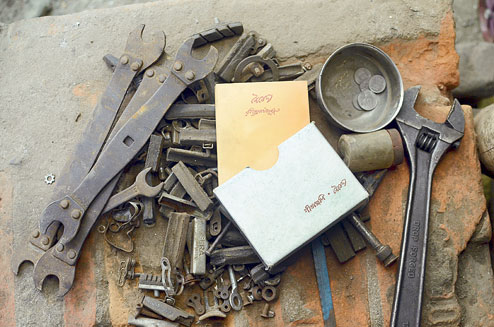
Kobida’s shop?” That’s the response you will get from anyone in CK Market if you ask for directions to the local cycle repair shop.
An ageing man sits at the edge of the market all smeared in grease, tightening the bolts of a cycle. He answers to the name “Kobi” too. It’s neither his name nor surname but a title he has earned.
“My real name is Kashi Nath Naskar but since I’m always talking poetry everyone calls me Kobi (poet),” smiles the man. Naskar breathes poetry. He knows most poems in Tagore’s Gitanjali and Naibedya by heart and quotes British Romantic poet Samuel Taylor Coleridge and Urdu poet Daagh Dehlvi with equal felicity. And all this while oiling cycles.
Of fishing net and black robe
Naskar is the first graduate in his family. “…in my village,” he corrects. He was born in Mahisbathan, behind what is now Sector V, in 1948. His mother was unlettered, his father had studied till Class III or IV and he has four brothers. “We are fisherfolk and milkmen but I loved studying and completed my B.Com from Maharaja Srish Chandra College, Shyambazar,” he says.
It was in college that Naskar borrowed Gitanjali from an acquaintance and fell in love with it. “Since then, I started reading whatever I could lay my hands on. I also started writing poetry.”
Naskar wanted to study law thereafter or join the West Bengal Civil Service but couldn’t afford the courses. “The rich people in our village wanted to pull me down as I was getting more educated than them. They lobbied against my family and made it difficult for us to sell our products. For the next 15 or so years, I tried to form a co-operative of us poor fishermen and fight the rich in court. It didn’t work out. I had to give up my dream of working in an office,” says Naskar, his bespectacled eyes blinking away tears. “I was almost suicidal at that point but poetry kept me alive,” he says, beginning to recite Tagore’s Kothay Alo but getting interrupted by a customer walking in with a punctured tyre.
Wherever he did the rounds for government paperwork, he discovered libraries — at Writers’ Buildings, Commercial Library in Dalhousie Square, National Library in Alipore, Asiatic Society library… “We could barely afford food those days so there was no question of buying books. It is at libraries that I got to read the entire works of Sarat Chandra Chattopadhyay and many works of Bankim Chandra Chattopadhyay and Sunil Ganguly. My favourite novel is Tagore’s Shesher Kobita.
Tarasankar Bandyopadhyay’s Saptapadi was also great but not its film version,” he says.

Wrench to Gitanjali
In the 80s, Naskar helped his brother start the sweet shop Panchanan Mistanna Bhander, that still stands in CK Market. His cycle repair shop came up a few years later.
“In the beginning, I was a fish out of water,” he recalls. “Wrenches were thrust into hands that only knew how to hold the pen. I had to learn everything from my employees.”
Even today a pocket-sized Gitanjali and Naibedya find pride of place amid his nuts and bolts. “I read them when I get tired of working,” he smiles. He knows the poems by heart.
Naskar writes poetry too. “My favourite subjects are god and peace although I also adapt Tagore’s poems such as Sathi and Duhswapna,” he says. “But since I work all day there’s not much time or energy to write these days,” says the 68-year-old.
Many of Naskar’s original writings got lost when he was shifting home a few years back but he’s not upset. “Dil gaya, tum ne liya/ Hum kya kare/ Jane wali cheez/ Ka gham kya kare,” he says, quoting a couplet by Urdu poet Daag Dehalvi.
Naskar got married some 25 years back and though his wife isn’t into poetry, his daughter is. “I don’t force it on her. She has done her graduation in geography and is studying animation now,” says the proud father.

Everyman’s poet
Naskar’s reputation has spread far and wide and residents come to chat with him about poetry or hear him recite.
“My husband Arnab and I come to CK Market for tea after our evening walk,” says Seemanti Dutta of AN Block in Sector V. “But truth be told, the tea is just an excuse to hear Kobida recite. He knows even long poems like Tagore’s Borsho Shesh by heart!”
Chittaranjan Bera, of Karunamoyee G Block, appreciates Naskar so much that he bought him the copies of Gitanjali and Naibedya that are his most prized possessions today. “I am a retired librarian from Konnogor College, so I encourage anyone who loves books,” he smiles. “His interest and talent are both extraordinary.”
Govinda Chatterjee of AL Block believes it is from poetry that Naskar draws his energy. “I am so impressed with Kobi that I had even invited him to come recite at our block’s Holi programme but he could not make it,” he says.
Not everyone admires Naskar’s talent. “Sometimes people get annoyed with my recitation and ask me to stop,” Naskar confesses.
“The other day someone said Tagore was overrated and that he was a bourgeois poet. I got livid and defended him. Shelley, Keats, Wordsworth, Byron are all great. I myself count Coleridge’s The Rime of the Ancient Mariner among my favourites,” he says taking a moment to recite the famous “Water, water, everywhere” line from the poem. “But have any of these poets been as prolific as Tagore? Have any of them contributed as much to literature?”
If he could, Naskar says he would read and write poetry all day. “But I have to work,” he says. “If you are a poet at heart then no matter what profession circumstances force you to choose, the poet in you will emerge.”
What is your message for Naskar? Write to saltlake@abpmail.com
source: http://www.telegraphindia.com / The Telegraph,Calcutta,India / Front Page> Salt Lake> Story / Brinda Sarkar / April 15th, 2016